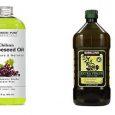Introduction
Using lube during sex is always a great idea as it would not only reduce the pain and friction during intercourse but also result in pleasurable and cozy experience – a commodity of sex.
There are diverse types and flavors of lubes available in the market, with different combinations of features that can make your shelf overflow if you plan on trying every one of them.
Quite paradoxically, you’ll find no lube nearby when the desire for pleasure cooks up, leaving you rifle through draws to find anything that can work as lube.
Canola Oil as a personal lube
Extracted from the rapeseed plant of the mustard family, Canola oil is a vegetable oil that is used for cooking delicious and healthy food. But can it be used as a DIY personal lubricant?
The good news is yes! It can be used as a lube during intercourse with the exception of quite a few circumstances.
There are three types of lubes; water-based, oil-based, and silicone-based lubes. The oil-based lubricants are further of two types: Synthetic and Natural. Canola oil, as obvious with the name, is a natural oil-based lubricant.
It is sperm-friendly
Canola oil is considered sperm-friendly lube and it doesn’t have any negative impact on sperm health and motility.
But this doesn’t mean that canola oil will increase your chances of getting pregnant, it just would leave them unchanged.
Although Canola Oil is safe to use during sex with little to no harm so far, it still has many limitations on its use. The cons of using Canola Oil as lube are:
Compatibility with condoms
Nowadays condoms are available in a variety of materials and latex is widely available form. Other than decreasing sensitivity and problems with storage, latex condoms prone to damage with the use of Oil-based lubricants.
The damage might not be visible to the naked eye but even a minute pore in the condom barrier can lead to transmission of infectious agents or sperm, leading to sexually transmitted diseases (STDs) and unwanted pregnancy respectively.
So latex condoms and canola oil don’t make up a good protective team. You can, however, use canola oil with synthetic condoms, such as those made with polyurethane film or synthetic elastomers.
Hard to cleanup
Despite the joyful ride it gives, dealing with canola oil can be arduous. Although it’s not thick it is sticky and messes up the after-mood.
It is difficult to wash away with wipes or water and stays put for a long time. You’ll need a shower and wash it off with soap and water if you want to avoid infections and skin irritation.
The scenario gets even more complicated with smudges left on your precious and fantasized sex clothes and sheets.
Risk of infection
Canola Oil is sticky, thus it blocks the skin pores and opens the door to a variety of infections. It can trap bacteria around the perineal region that could increase the chances of infections.
A study found that putting over the counter products, tampoons, and oil into the vagina can significantly increase the risk of bacterial vaginosis and candida infection.
Allergic reactions
You don’t know what could you be allergic to until you try it for the first time. Although allergy to Canola Oil is rare, it could lead to unpleasant experiences.
Check for potential chances of allergy to Canola Oil by putting a small quantity of oil over your arm and look for any changes in skin color or irritation.
Conclusion
Canola Oil is a natural product and can be used as a lubricant for sex in cases of urgency.
Other than the precaution of not using it in combination with latex condoms, there are no absolute contraindications to trying it out for the first time. Keeping its sperm-friendly benefits in mind, you can indulge in pleasurable sex!
Read next: Cornstarch Lube- A Safe and Effective DIY Lube Option
References
- https://www.reuters.com/article/us-study-lubricants/study-warns-some-lubricants-could-block-conception-idUSBREA131OU20140204
- Sandhu, Ranjit S. et al. In vitro effects of coital lubricants and synthetic and natural oils on sperm motility. Fertility and Sterility, Volume 101, Issue 4, 941 – 944
- Voeller, Bruce et al. Mineral oil lubricants cause rapid deterioration of latex condoms. Contraception, Volume 39, Issue 1, 95 – 102
- Danby, S. G., AlEnezi, T. , Sultan, A. , Lavender, T. , Chittock, J. , Brown, K. and Cork, M. J. (2013), Effect of Olive and Sunflower Seed Oil on the Adult Skin Barrier: Implications for Neonatal Skin Care. Pediatr Dermatol, 30: 42-50. doi:10.1111/j.1525-1470.2012.01865.x
- Brown, Joelle M., Hess, Kristen L. et al. Intravaginal Practices and Risk of Bacterial Vaginosis and Candidiasis Infection Among a Cohort of Women in the United States. Obstetrics & Gynecology: April 2013 – Volume 121 – Issue 4 – p 773–780. doi: 10.1097/AOG.0b013e31828786f8






 Ali Anique is a doctor at Nishtar Hospital, the biggest hospital of south Punjab province in Pakistan. He holds an MBBS degree from the Nishtar Medical College (now university).
Ali Anique is a doctor at Nishtar Hospital, the biggest hospital of south Punjab province in Pakistan. He holds an MBBS degree from the Nishtar Medical College (now university).